Des Moines, Iowa, a city known for its vibrant culture and rich history, holds memories within its evolving landscape. For many, Southeast 14th Street is synonymous with Menards, the popular home improvement store. But before the aisles of lumber and appliances, this location was once a beacon of entertainment under the stars: the Southeast 14th Street Drive-In. This article revisits the era of drive-in movie theaters in Des Moines, exploring the history of these beloved outdoor cinemas and how locations like the former Southeast 14th Street Drive-In paved the way for modern landmarks like Menards.
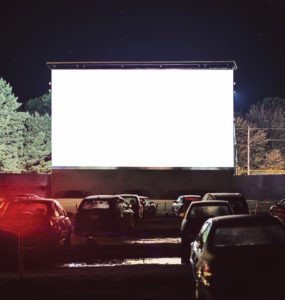
Nostalgic image of a drive-in movie screen evoking the golden age of outdoor cinemas.
The allure of drive-in theaters peaked in the mid-20th century, transforming the American movie-going experience. Starting from a handful of venues, their numbers exploded to nearly 4,000 across the nation in the late 1950s and early 1960s. Iowa, with its sprawling rural landscapes and close-knit communities, became a prime spot for these open-air theaters. Families flocked to drive-ins, drawn by the promise of affordable entertainment – often two or even three movies for the price of one ticket – all enjoyed from the comfort of their cars under the vast night sky. The iconic intermission announcements, inviting patrons to grab refreshments, became a part of the charming drive-in experience.
However, the golden age of drive-ins proved to be fleeting. Changing consumer preferences, the rise of year-round entertainment options, and the limitations of seasonal operation led to a decline. Drive-ins, primarily profitable during warmer months and evening hours, struggled to compete with businesses operating around the clock. While some drive-ins attempted to extend their season with car heaters, the inconvenience of cumbersome equipment and open windows in chilly weather did little to sway audiences accustomed to the comfort of indoor cinemas and, later, home entertainment systems. One by one, drive-in theaters began to close, many eventually demolished to make way for new developments.
For those in Des Moines, the memory of drive-ins might seem like a distant echo, yet remnants of this era persist. The Valle Drive-In in Newton stands as a testament to the enduring appeal of outdoor movies, one of only four drive-ins remaining in Iowa. While many Des Moines drive-ins have faded into history, their stories are etched into the city’s landscape.
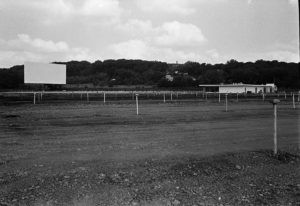
A collection of vintage photographs showcasing various drive-in theaters in Des Moines and their architectural styles.
To understand the drive-in history of Des Moines, one can look to the work of local filmmaker Mark Heggen. His documentary “Lost Cinemas of Greater Des Moines” sheds light on the city’s rich cinematic past, highlighting the drive-in theaters that once dotted the outskirts. These locations, initially on the edge of town, were gradually enveloped by urban expansion. As Des Moines grew, the low-light conditions ideal for drive-ins were replaced by the ambient brightness of city life, contributing to their eventual closure.
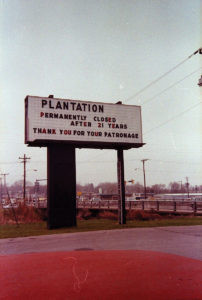
A historical image of the Plantation Drive-In’s towering screen, once the largest in the Midwest, emphasizing its grand scale.
Remembering Des Moines’ Drive-In Theaters
Plantation Drive-In: A Midwest Giant
Located near the intersection of 63rd Street and Grand Avenue in West Des Moines, the Plantation Drive-In was a true giant in its time. Opening in 1965, this 950-car theater boasted the largest movie screen in the Midwest, an impressive 50 feet tall and 120 feet wide. Owned by Richard Davis, Clay Musk, and Bob Fridley, the Plantation aimed for comfort, even offering 402 car heaters. However, its location in a flood plain proved to be its downfall, leading to its closure in 1986. Imagine watching “The Poseidon Adventure” during a downpour at the Plantation, as filmmaker Mark Heggen recalls, the on-screen tidal wave mirroring the real rain, creating a uniquely disorienting cinematic experience.
Southeast 14th Street Drive-In: From Movies to Menards
The land now occupied by Menards on SE 14th Street in Des Moines has a history rooted in entertainment. Before the hardware store became a local fixture, the Southeast 14th Street Drive-In thrived at 6000 S.E. 14th St., Des Moines. Opening in 1948 with the Marx Brothers’ classic “A Night in Casablanca,” this 600-car drive-in, operated by Central States Theaters, served the community for nearly five decades. Seeking to maximize its use, the theater experimented with daytime events, hosting church services on Sundays and swap meets on Saturdays. While the concept of drive-in church services, complete with concession stand coffee, was novel, it was the movies that remained the main draw. Ultimately, the Southeast 14th Street Drive-In closed its doors in 1995, its final triple feature a memorable lineup of “Dangerous Minds,” “Judge Dredd,” and “Species.” Today, as you shop for home improvement supplies at Menards Se 14th Street Des Moines, you’re walking on ground that once echoed with movie soundtracks and the laughter of families enjoying a night out at the drive-in.
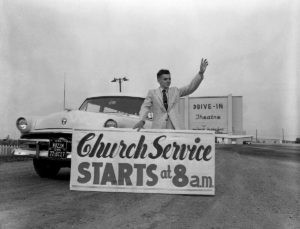
An archival photograph of the Southeast 14th Street Drive-In in its prime, contrasting with the modern Menards store at the same location.
Capitol Drive-In: Cappy the Clown and Casino Confusion
Further north on East 14th Street, the Capitol Drive-In at 4646 N.E. 14th St. added to the area’s drive-in density. Opening in 1952, this 728-car theater was designed with family entertainment in mind, featuring a playground and concession stands with patios. The Capitol was also known for its eye-catching neon sign featuring Cappy the Clown, the drive-in’s mascot. Rumor had it that travelers on I-80 mistook the brightly lit sign for a casino. Despite its popularity, the Capitol Drive-In, like many others, succumbed to changing times and was demolished in the early 1980s.
Pioneer Drive-In: The Billboard Screen
On Southeast 14th Street, at 2099 S.E. 14th St., the Pioneer Drive-In offered another outdoor movie option. Operating from 1959 with a capacity of 700 cars, the Pioneer’s most visible legacy today is its screen. Many Des Moines residents might recognize the large white structure behind the RV park on Southeast 14th Street, often mistaken for a billboard. This is, in fact, the screen of the former Pioneer Drive-In, a silent reminder of the area’s drive-in past.
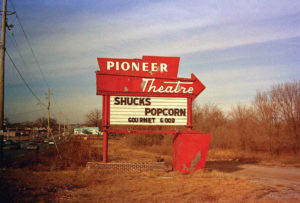
A contemporary photo of the old Pioneer Drive-In screen, now resembling a billboard behind an RV park, illustrating the repurposing of drive-in infrastructure.
While nostalgia for the drive-in era is strong, the reality is that these theaters faced significant challenges in adapting to modern entertainment demands. The simple gravel lots and basic audio setups couldn’t compete with the comfort and technology of contemporary cinemas and home streaming services. However, the few remaining drive-ins, like the Valle Drive-In, offer a unique and valuable experience, a step back in time that emphasizes community and simpler pleasures. Supporting these surviving drive-ins is a way to preserve a piece of American culture and enjoy a movie night under the stars, a far cry from the fluorescent lights of a hardware store, yet a reminder of the evolving stories embedded within the landscape of places like Menards on SE 14th Street in Des Moines.

